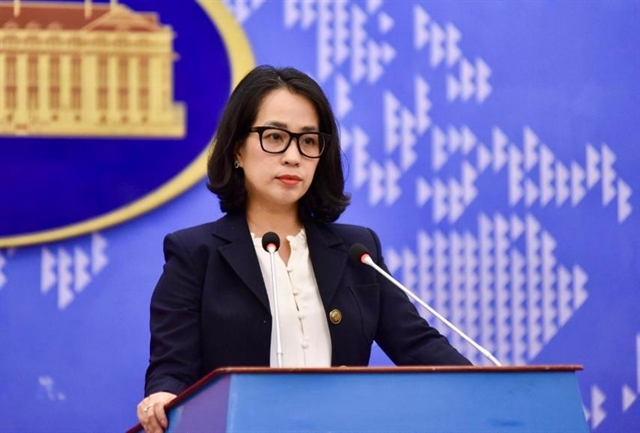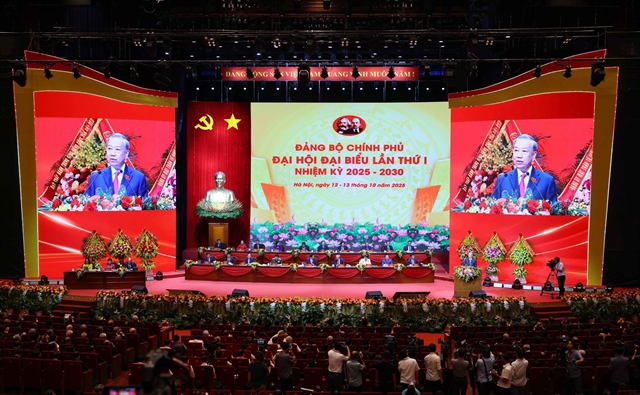 Politics & Law
Politics & Law

 |
| Party General Secretary Tô Lâm speaks at the opening session of the first Congress of the Government’s Party Organisation for the 2025–2030 tenure on Monday. VNA/VNS Photo |
HÀ NỘI — Party General Secretary Tô Lâm has urged the Government’s Party Organisation to prioritise the implementation of three strategic breakthroughs in institutions, infrastructure and human resources to unlock traditional growth drivers and foster breakthroughs in new ones, aiming for double-digit economic growth during 2026–2030.
He made the statement while attending the first Congress of the Government’s Party Organisation for the 2025–2030 tenure, which opened in Hà Nội on Monday. The congress gathers 453 delegates representing over 209,000 Party members across 2,211 Party units under the Government’s Party Organisation.
Speaking at the opening session, the Party leader commended the Standing Board of the Government’s Party Organisation for its methodical and well-prepared congress arrangements, ensuring both quality and progress in line with Directive No 45 of the Politburo.
He noted that the Politburo had also provided directional opinions on the congress’s draft documents and personnel plans. The draft reports, he said, are aligned with the orientations outlined in the draft Political Report of the 14th National Party Congress, as well as relevant resolutions, conclusions and directives of the Party Central Committee, the Politburo and the Secretariat, while remaining consistent with the practical circumstances of the Government’s Party Organisation.
General Secretary Lâm praised the significant achievements of the Government’s Party Organisation during the 2020–2025 term, describing them as a solid foundation and new driving force for the next tenure.
While acknowledging these accomplishments, he called for frank discussions to identify the causes of existing shortcomings and devise comprehensive, strategic solutions to enhance the performance of both the Government and its Party Organisation in the coming years.
He expressed overall agreement with the political report and action programme, which outline the directions, objectives, targets, tasks, strategic breakthroughs and specific measures for the new term.
The Party chief emphasised three key requirements.
First, he called for unity in perception and vision to clearly define the goal of guiding Việt Nam towards an era of prosperity, civilisation and happiness.
Second, he urged greater effort and innovation to enhance forecasting, leadership and governance capacity, to foster creativity in state management and to adopt practical orientations and policies aimed at improving the material and spiritual wellbeing of the people.
Third, he stressed the need to build a capable and virtuous contingent of officials and public servants with strong political will, high professional competence, integrity and a deep sense of responsibility.
Identifying five key tasks, General Secretary Lâm highlighted the special role of the Government’s Party Organisation within the political system, as it brings together strategic-level leaders and managers responsible for translating the Party’s policies into laws, mechanisms and state policies.
He stressed the need to focus on economic development, maintaining macroeconomic stability, controlling inflation and ensuring major economic balances.
During the 2026–2030 period, policies on monetary and fiscal management must be implemented flexibly and effectively; bottlenecks in production and business must be removed; and traditional growth drivers must be reinvigorated while breakthroughs are made in new growth areas such as the digital economy, green economy and circular economy.
He also called for decisive action to resolve delayed projects and weak banks, ensuring a healthy and sustainable financial–economic system.
The Party leader underscored the need to establish a new growth model that ensures both rapid and sustainable development, driven by science, technology, innovation and digital transformation, with an emphasis on achieving technological self-reliance, particularly in strategic sectors.
He urged stronger development of the domestic market while diversifying international markets and enhancing product quality to enable Việt Nam’s deeper integration into regional and global supply chains.
The General Secretary also instructed localities to address chronic issues such as flooding and environmental pollution that affect people’s livelihoods and socio-economic development, and to proactively prepare comprehensive disaster response plans.
Reiterating the focus on the three strategic breakthroughs, he said that institutions must become a competitive advantage, unleashing all productive potential and mobilising every resource for development. Administrative procedures must be simplified to foster entrepreneurship and innovation and the business environment must be improved.
He called for investment in strategic infrastructure, including transport, seaports, high-speed and urban railways, as well as research and development of programmes to exploit space, marine and underground resources to open new economic opportunities.
Regarding human resource development, he stressed the need to build a modern national education system on par with regional and global standards, achieving marked improvements in quality across all levels, to nurture and utilise talents, and to train high-quality human resources to meet the demands of scientific, technological and digital transformation.
He also highlighted the importance of harmonising cultural, economic and social development, ensuring no one is left behind, and fostering a civilised, united and progressive society.
The General Secretary concluded by calling for strengthened national defence and security, enhanced foreign affairs and international integration, and efforts to consolidate and elevate Việt Nam’s international prestige and position, maintaining a peaceful and stable environment for national development. — VNS